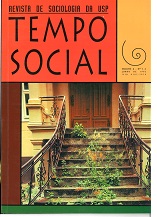Modernity´s pendulum
DOI:
https://doi.org/10.1590/ts.v6i1/2.85044Keywords:
Modernity, Capitalism, Socialism, Dualism, Social order, Totalitarism, IndividualismAbstract
The bicentennial year of the French Revolution, in 1989, and the antitotalitarian revolutions in Eastern Europe during 1989 and 1991 lead the authors to interpreting modernity through the pendulum´s metaphor, used in order to show the dynamics of the present social arrangement, pluralistic and autonomous, and which swings without stopping between radicalism and moderation. In order to make a diagnosis of the modern´s self-knowledge, the text analyses questions refering to modernity and its problems: Totalitarianism is the offspring of modernity? How the avoid it? Van the 1789 promises be kept? And it appeals to history for evaluating skeptically modernity starting from its two survival conditions: modernity´s dynamic (dialectics), which works through the auto-reflective dynamic justice, and the modem social arrangement, a constant framework of symmetric and asymmetric (re)-distribution of freedom and life-chances. This article introduces the dynamic logic of modernity (the functional division of labour, statecraft and technology) showing that they, operating together or in conflict with one another; usually move the modernity´s pendulum between the poles of "individualism" and "communitarianism", between "welfarism" and the practise of a self-regulating market, so that it doesn´t swing between binary oppositions ("capitalism" and "socialism", "right" and "left", "progress" and "reaction"). At the end, the outcoming political effects derived from the perception of the pendulum´s existence in modernity are emphasized. Politics becomes a post-modern one: the will to the transcendence of modernity ends: new alliances, "contextually" and some universalist premises in the political field become important: the "way of life" prevails over the "class". However, the text points out the problems of these anti-holistic ideals which can bring about intolerance and the impossibility of a collective medium of understanding.Downloads
Download data is not yet available.
Downloads
Published
1994-07-06
Issue
Section
Articles
License
Copyright (c) 1994 Tempo Social

This work is licensed under a Creative Commons Attribution-NonCommercial 4.0 International License.
How to Cite
Fehér, Ágnes H. e F. (1994). Modernity´s pendulum. Tempo Social, 6(1/2), 47-82. https://doi.org/10.1590/ts.v6i1/2.85044


